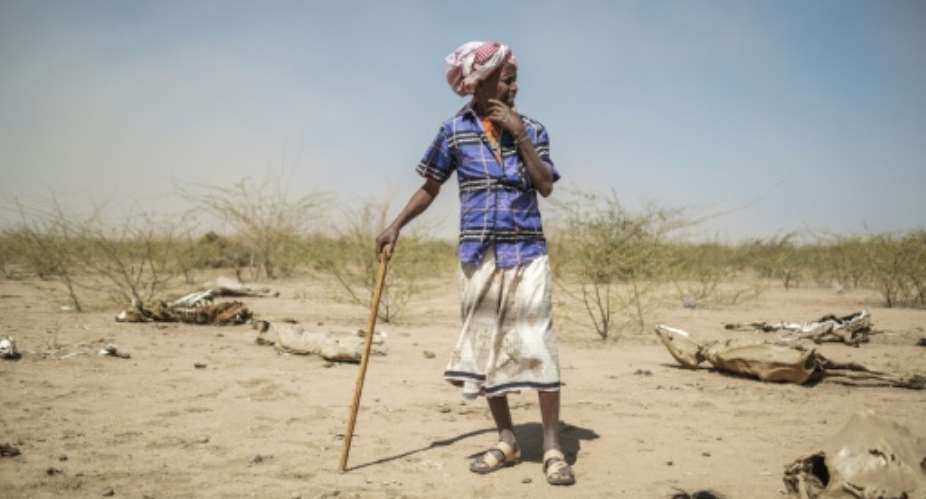Countries on Tuesday pledged more than $610 million to address the "critical" humanitarian situation in Ethiopia, where more than 21 million people need aid and a dire food crisis is deepening.
The donor conference at the United Nations' European headquarters had sought to raise significant pledges towards the $1 billion the UN has said is urgently needed to cover aid for just the next three months.
The conference hosts had stressed in advance that they did not expect to raise that full amount on Tuesday, but rather to begin closing the gap between needs and funding.
"We understand this is just the beginning, and we hope for continued and increased support throughout the year," UN Assistant Secretary-General for Humanitarian Affairs Joyce Msuya said in a statement.
Twenty countries in all made new pledges, with Ethiopia's top donor the United States saying it had pledged an additional $154 million.
Britain, which co-hosted Tuesday's conference, ledged 100 million pounds ($125 million), while the European Union said that with member states it had pledged more than 131 million euros ($139 million).
Ethiopians are facing rumbling internal conflicts amid economic and climate shocks and an increasingly dire food and malnutrition crisis.
The UN has said $3.24 billion is needed this year alone, including to assist some four million internally displaced people.
But before Tuesday's event, that plan was less than five percent funded.
"The gap remains very wide... We have really to act before it is too late," Shiferaw Teklemariam, commissioner of the Ethiopian Disaster Risk Management Commission, told reporters in Geneva before the start of the conference.
The UN said an initial $1 billion was needed for the urgent aid response through the end of June.
It is also needed to prepare for the lean season, from July to September, when around 11 million people are projected to be critically food insecure.
'Very fragile'
"The humanitarian situation in Ethiopia is critical -- but there is a window to act right now to break the downward spiral," the UN's humanitarian agency OCHA said.
Britain's deputy foreign minister Andrew Mitchell said the situation was "extremely worrying".
He spoke before the conference of "increasingly worrying famine conditions", but stressed the international community, working closely with the Ethiopian government, was "in a position to head it off".
Washington also stressed the need for rapid action.
"We have millions and millions of people in Ethiopia facing very severe food insecurity," USAID Deputy Administrator Isobel Coleman told AFP ahead of the conference, warning "the humanitarian situation in the country remains very, very fragile".
Without more aid, "the consequences could be very dire", she said.
'Not enough aid to distribute'
Coleman also stressed that strong measures would be needed to ensure the aid reaches its intended destination.
Last year, USAID and the UN's World Food Programme temporarily halted all food aid to Ethiopia, alleging a "widespread and coordinated" campaign to divert donated supplies -- something Ethiopia's government denied.
Ramiz Alakbarov, the UN humanitarian coordinator in Ethiopia, stressed that distribution had since resumed, following stringent reforms and the introduction of "one of the most detailed, and the most verified processes I have ever observed in my life".
He voiced confidence the system was working and all aid would reach its intended destination. "The problem is that we don't have enough to distribute."
Authorities in the war-ravaged northern Tigray region warned last December it was on the brink of famine.
"So much of this food insecurity is being driven by conflict," Coleman said.
"Until we have peace and security in the country, which allows full access for humanitarian players we're really not going to be able to get a full handle on this humanitarian crisis."





 Akufo-Addo’s recent attitude, utterances connote an arrogant nature, smack of an...
Akufo-Addo’s recent attitude, utterances connote an arrogant nature, smack of an...
 NDC calls for immediate termination of contracts between SML and GRA
NDC calls for immediate termination of contracts between SML and GRA
 NDC demands retrieval of monies paid to SML, calls for the prosecution of person...
NDC demands retrieval of monies paid to SML, calls for the prosecution of person...
 NDC accuses President Akufo-Addo of attempting to cover up corruption and crimin...
NDC accuses President Akufo-Addo of attempting to cover up corruption and crimin...
 Election 2024: ‘I don't want issues of independent candidature to plague NPP’ — ...
Election 2024: ‘I don't want issues of independent candidature to plague NPP’ — ...
 2024 elections: Bawumia avoiding economic discourse because he has failed — Kwak...
2024 elections: Bawumia avoiding economic discourse because he has failed — Kwak...
 Mustapha Ussif’s ‘Best African Sports Minister’ award signifies his exceptional ...
Mustapha Ussif’s ‘Best African Sports Minister’ award signifies his exceptional ...
 Anti-LGBQI+ Bill: High Court’s verdict was predetermined – Sam George
Anti-LGBQI+ Bill: High Court’s verdict was predetermined – Sam George
 Justification for continuation of SML-GRA contract ‘hogwash’ – Sammy Gyamfi
Justification for continuation of SML-GRA contract ‘hogwash’ – Sammy Gyamfi
 Bawumia is a liar, google it and see – Osofo Kyiri Abosom
Bawumia is a liar, google it and see – Osofo Kyiri Abosom
